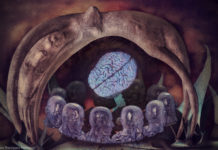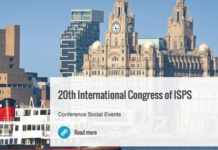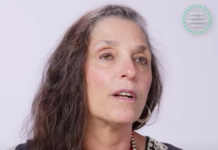“Does Schizophrenia Exist on an Autism-Like Spectrum?”
The results of epidemiological studies of the prevalence of hallucinations strongly imply that psychosis exists on a spectrum, according to the Scientific American. This suggests “that the standard treatment for a psychotic episode might be due for an overhaul.”
A Glimpse Inside US Mental Health Detention Centre
From The Sun: New York photographer Lili Holzer-Glier was recently allowed inside the Cook County Department of Corrections in Chicago, where 35 percent of inmates...
Compassion and the Voice of the Tormentor
I'd like to share some personal thoughts on the nature of the Hearing Voices group method, and the insights that this kind of support generates. Through these groups, a tradition of mutual healing is being created that honors subjective experiences, and sharing our stories with each other in this way propels this exciting movement forward.
Fighting for the Meaning of Madness: An Interview with Dr. John Read
Akansha Vaswani interviews Dr. John Read about the influences on his work and his research on madness, psychosis, and the mental health industry.
‘Mad’ Psychologist Speaks Out
Yet again I find myself in the painful, ridiculous and uncomfortable position of having to try to do my best to repair the extensive damage which is being done to vulnerable survivors of child abuse by the system. Yet again I am powerless to do much about it.
Understanding Madness as Revolution, Then Working Toward Peace
While some will frame Eleanor Longden’s story, told in her awesome TED video (which has now been viewed about 1/2 million times!), as the triumph of an individual struggling against “mental illness,” I believe the story might better be seen as a refutation of the whole “illness of the mind” metaphor, and as an indication of a desperate need for a new paradigm.
Researchers Explore Sexuality and Gender in the Context of Psychosis
Nev Jones and a team of researchers examine how sex, sexuality, and gender-related content are underexplored in contemporary research on psychosis.
Avatar Therapy: A New Battle for the Tree of Life
In the film Avatar, scientists are keen to exploit the moon planet Pandora which is inhabited by 10-foot-tall blue humanoids called Na'vi. To do so they create Na'vi human hybrids called “Avatars” which are controlled from afar by genetically matched humans. When the scientists decide to destroy the eco-system of the planet to gain access to valuable minerals, war breaks out between the humans and the Na'vi. At this point the main character, Jake, who operates an Avatar, has to choose whose side he is on. Eventually Jake's life is saved and transformed by the Tree of Souls, which the humans are trying to destroy.
Why are Avatars in the news again? The latest innovation from psychiatric research is using computer-generated avatars to help people who hear aggressive voices.
“Healing Voices” Documentary Announces Grass Roots Non-Theatrical Release
The producers of “Healing Voices” – a new social action documentary about mental health – have announced an innovative plan to release the film via community screening partners in a coordinated one-night global event. Written and Directed by PJ Moynihan of Digital Eyes Film, “Healing Voices” explores the experience commonly labeled as ‘psychosis’ through the stories of real-life individuals, and asks the question: What are we talking about when we talk about ‘mental illness’? The film follows three subjects – Oryx, Jen, Dan – over nearly five years, and features interviews with notable international experts including: Robert Whitaker, Dr. Bruce Levine, Celia Brown, Will Hall, Dr. Marius Romme, and others, on the history of psychiatry and the rise of the ‘medical model’ of mental illness.
“A Nonbeliever Tries To Make Sense Of The Visions She Had As A Teen”
"People have these unaccountable mystic experiences," Barbara Ehrenreich tells Fresh Air's Terry Gross about her new book, Living With a Wild God: A Nonbeliever's Search...
“25 Years of Madness and Modernism”: A Review
In this piece for the Centre for Medical Humanities, James Whitehead reflects on the 25th anniversary celebration of the publication of Louis Sass's Madness and Modernism.
"A...
Dissociative Experiences Mediate Childhood Trauma/Auditory Hallucinations
Researchers in Spain assessed 71 patients diagnosed with psychoses for dissociative experiences, trauma, delusions and hallucinations. Childhood trauma was positively associated with dissociation (r =...
The Voices My Daughter Hears
The voices were extraordinary; in a way, they were like ghosts. I could not see them, but only divine them by the turmoil they stirred up in Annie. They were not polite house ghosts who knew when to leave; they were ne’er-do-wells she could not get rid of. They were tormentors and torturers, testing the limits of her sanity, blackmailing her into submission.
Pledge Support for Changes in Understanding of Psychosis
From Critical Psychiatry: The International Society of Psychological and Social Approaches to Psychosis (ISPS) has produced a 'Liverpool Declaration' stating that psychosis needs to be...
Mental Health Industry Should Embrace Choices Beyond Drugs
In this video for NowThis, Yana Jacobs critiques the mental health industry standard of prescribing drugs as the first-line treatment for "mental illness." She emphasizes...
Virtual Reality Promising for Mental Health Treatment
From Healio: A recent review indicated that virtual reality-based treatment may be effective for a variety of mental health concerns including phobias, social anxiety, PTSD,...
United Nations Report Calls for Revolution in Mental Health Care
In a new report, the United Nations Special Rapporteur on the right to health, Dr. Dainius Pūras, calls for a move away from the biomedical model and “excessive use of psychotropic medicines.”
“Canadian Patients Fight Forced Electroshock”
"A retired nurse, a Harvard-educated musician and others sued British Columbia this week, claiming it forcibly subjects mental health patients to electroconvulsive therapy and...
Your Pills Are Spying On You
From Pacific Standard: The new Abilify MyCite pill, which contains a digital sensor that tracks whether a patient has ingested the drug, has the potential...
I Wonder if There is Some Axis II Going on Here? Further Thoughts on...
This blog was prompted by an invitation to do a guest post on the site of one of my favorite bloggers, 1 Boring Old Man. This is my response to the notion that there are certain conditions - Schizophrenia among them - that correspond more directly to biomedical conditions
Epilepsy Drugs Can Induce Psychosis in Some Patients, Study Finds
In this month’s issue of the journal Brain a new study investigates whether the drugs prescribed to control seizures can increase the risk of...
What Are Best Practices For Psychosis And What Gets In The Way?
Research investigates clinicians’ perspectives on best care practices and the complicated realities of providing care in the face of agency limitations and mechanized interventions.
Barriers to Engaging in Self-Help CBT for Voice Hearing
Individuals with lived experience and clinicians share about barriers and facilitators to guided self-help CBT for voice hearing.
Exercise Effective for Early Psychosis, Studies Show
A new study out of the University of Manchester found that personalized exercise programs reduced the symptoms for young people suffering from their first episode of psychosis. Researchers also conducted an accompanying qualitative analysis and found that the participants experienced improved mental health, confidence, and a sense of achievement and felt that autonomy and social support were critical to their success.
“When the Brain is Under Attack”
The Boston Globe reports on the discovery of a newly recognized neurological disease, anti-NMDA receptor encephalitis. The disease is believed to be caused when the body’s immune system attacks proteins in the brain associated with the communication of neurons.























